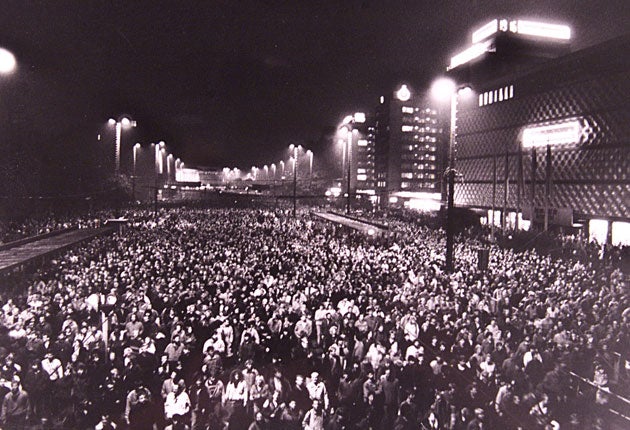The week the Iron Curtain began to be torn apart
Twenty years ago, marches convulsed the cities of East Germany, from Berlin to Leipzig and Dresden

Countdown to the fall of the wall
In 1989, the Communist bloc began to crumble. Russia repudiated the Brezhnev Doctrine (used to justify military interference in Warsaw Pact countries), declined to stop Poland holding free elections, then watched, impotently, as Hungary opted for democracy.
And, that summer, despite attempted clampdowns, tens of thousands of East Germans escaped over the Hungarian and Austrian borders - a criminal offence in their own land.
As demonstrations grew in strength, the East Berlin authorities struggled to contain pressure for freedom. Our build-up to the fall of the wall –as reported by The Independent - begins 20 years ago:
18 October 1989
East Germany's ruling Communist Party agreed yesterday to retire its veteran leader Erich Honecker, 77, following mass emigration and huge demonstrations for political reform.
His successor was named as Egon Krenz, 52, the country's security chief, who has been seen as a protégé of the hardline Mr Honecker. In a debut speech broadcast last night, Mr Krenz criticised the party's past insensitivity, and expressed sympathy with families divided by emigration. "We must recognise the signs of the times and react accordingly, or we will be punished by life itself," he said.
20 October 1989
In a drastic bid to stem or even reverse the exodus of tens of thousands of its citizens in recent weeks, East Germany said yesterday that those who had fled to the West would be allowed to apply to return.
The new conciliatory tone is a remarkable turnaround from the government's position of only two weeks ago, when official commentaries said "we should weep no tears" for the refugees, many of whom were formally expelled from the country.
In addition, the authorities yesterday lifted a ban on Sputnik, a Soviet magazine banned in the country last year because of its radical tone. In Dresden last night, up to 50,000 people staged a silent, candlelit march in the biggest demonstration for reform since Mr Krenz took over.
22 October 1989
In East Berlin on Saturday, several thousand demonstrators formed a human chain through the city centre. Politburo member Günter Schabowski, in his meeting with the crowds, admitted the depths of scepticism that the government now faces: "We will have to get used to living for a time with people seeing everything we do as a trap – even though it isn't."
In the southern border town of Plauen, marchers shouted "Freedom of speech" and "Freedom of travel". The official East German news agency, ADN – which until a few days ago ignored popular protests entirely – said around 15,000 took part (eyewitnesses said the crowd was twice that size). Police did not intervene.
West German border police said yesterday that 1,300 East Germans had entered West Germany via Austria in the past 24 hours.
23 October 1989
Up to 250,000 East Germans marched through the streets of Leipzig yesterday, and thousands more filled the streets of three other cities in the biggest protests yet during East Germany's rising political turmoil. It was a clear sign that the popular pressure for reform in East Germany has in no way been diminished by last week's change of leadership, nor by the new hints of glasnost.
The Leipzig march eclipsed by far even last week's demonstrations, which brought more than 100,000 on to the streets, and which, at that point, were the largest seen in East Germany for more than 30 years. The first hints of industrial solidarity are appearing: some workers in East Berlin yesterday announced the formation of an independent trade union.
Demonstrators in Leipzig shouted "Free elections", "We are the people", and "Freedom for detainees". Police allowed the march to go ahead without interference. It was the third Monday night in succession that the numbers marching in Leipzig have doubled. In the city of Halle, south-west of Berlin, 10,000 demonstrated for reform yesterday, shouting "Gorby! Gorby!", and in Dresden thousands of people massed on streets and squares. In East Berlin, several thousand people gathered at the Gethsemane Church and held candles aloft in a service for those people still held in detention after demonstrations.
Last night's demonstration heard slogans more radical than the leadership can stomach. Freer travel has been promised, but free elections – as agreed to in Poland and Hungary – are an impossibility if the East German state is to survive.
Join our commenting forum
Join thought-provoking conversations, follow other Independent readers and see their replies
Comments
Bookmark popover
Removed from bookmarks